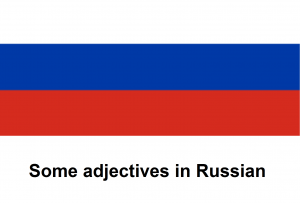Difference between revisions of "Language/Russian/Vocabulary/Common-adjectives"
| Line 98: | Line 98: | ||
1. "The fast dog runs." | 1. "The fast dog runs." | ||
: '''Russian Translation''': "Быстрая собака бежит." | |||
:: Note: "Быстрая" is the feminine form of "быстрый" because "собака" (dog) is a feminine noun in Russian. | |||
2. "She is a beautiful woman." | 2. "She is a beautiful woman." | ||
: '''Russian Translation''': "Она красивая женщина." | |||
:: Note: "Красивая" is the feminine form of "красивый" to agree with "женщина" (woman), which is feminine. | |||
3. "They are happy children." | 3. "They are happy children." | ||
: '''Russian Translation''': "Они счастливые дети." | |||
:: Note: "Счастливые" is the plural form of "счастливый" to agree with "дети" (children), which is plural. | |||
==== Exercise 2: Conjugate the following adjectives to match the noun they modify ==== | ==== Exercise 2: Conjugate the following adjectives to match the noun they modify ==== | ||
1. "big (большой) house" | 1. "big (большой) house" | ||
: '''Conjugated Form''': "большой дом" | |||
:: Note: "Большой" remains in its masculine form because "дом" (house) is masculine. | |||
2. "interesting (интересный) book" | 2. "interesting (интересный) book" | ||
: '''Conjugated Form''': "интересная книга" | |||
:: Note: "Интересная" is the feminine form of "интересный" since "книга" (book) is feminine. | |||
3. "old (старый) man" | 3. "old (старый) man" | ||
: '''Conjugated Form''': "старый мужчина" | |||
:: Note: "Старый" stays in its masculine form to match "мужчина" (man), which is masculine. | |||
==Other Lessons== | ==Other Lessons== | ||
Latest revision as of 14:00, 13 December 2023
Russian Vocabulary: Common Adjectives[edit | edit source]
This page is dedicated to teaching common adjectives in the Russian language. It includes a variety of adjectives that are frequently used in everyday conversation.
Introduction[edit | edit source]
Russian adjectives agree in gender, number, and case with the nouns they modify. This section provides an overview of this concept with examples.
- Example
- хороший (good - masculine)
- хорошая (good - feminine)
- хорошее (good - neuter)
- хорошие (good - plural)
List of Common Adjectives[edit | edit source]
Below is a list of common Russian adjectives with their English translations. Each adjective is presented in its masculine form.
- Positive Adjectives
-
- Красивый (beautiful)
- Умный (smart)
- Быстрый (fast)
- Сильный (strong)
- Забавный (funny)
- Negative Adjectives
-
- Плохой (bad)
- Слабый (weak)
- Медленный (slow)
- Грустный (sad)
- Трудный (difficult)
Adjective Declension[edit | edit source]
This section explains how adjectives change form depending on the gender, number, and case of the noun they modify.
- Declension Table
| Case | Masculine | Feminine | Neuter | Plural |
|---|---|---|---|---|
| Nominative | хороший | хорошая | хорошее | хорошие |
| Accusative | хороший | хорошую | хорошее | хорошие |
| Genitive | хорошего | хорошей | хорошего | хороших |
| Dative | хорошему | хорошей | хорошему | хорошим |
| Instrumental | хорошим | хорошей | хорошим | хорошими |
| Prepositional | хорошем | хорошей | хорошем | хороших |
Practice Exercises[edit | edit source]
Include a section with practice exercises to help learners practice using these adjectives in sentences.
- Exercise 1
- Translate the following sentences from English to Russian.
- "The fast dog runs."
- "She is a beautiful woman."
- "They are happy children."
- Exercise 2
- Conjugate the following adjectives to match the noun they modify.
- "big (большой) house"
- "interesting (интересный) book"
- "old (старый) man"
Solutions to Practice Exercises[edit | edit source]
Exercise 1: Translate the following sentences from English to Russian[edit | edit source]
1. "The fast dog runs."
- Russian Translation: "Быстрая собака бежит."
- Note: "Быстрая" is the feminine form of "быстрый" because "собака" (dog) is a feminine noun in Russian.
2. "She is a beautiful woman."
- Russian Translation: "Она красивая женщина."
- Note: "Красивая" is the feminine form of "красивый" to agree with "женщина" (woman), which is feminine.
3. "They are happy children."
- Russian Translation: "Они счастливые дети."
- Note: "Счастливые" is the plural form of "счастливый" to agree with "дети" (children), which is plural.
Exercise 2: Conjugate the following adjectives to match the noun they modify[edit | edit source]
1. "big (большой) house"
- Conjugated Form: "большой дом"
- Note: "Большой" remains in its masculine form because "дом" (house) is masculine.
2. "interesting (интересный) book"
- Conjugated Form: "интересная книга"
- Note: "Интересная" is the feminine form of "интересный" since "книга" (book) is feminine.
3. "old (старый) man"
- Conjugated Form: "старый мужчина"
- Note: "Старый" stays in its masculine form to match "мужчина" (man), which is masculine.
Other Lessons[edit | edit source]
